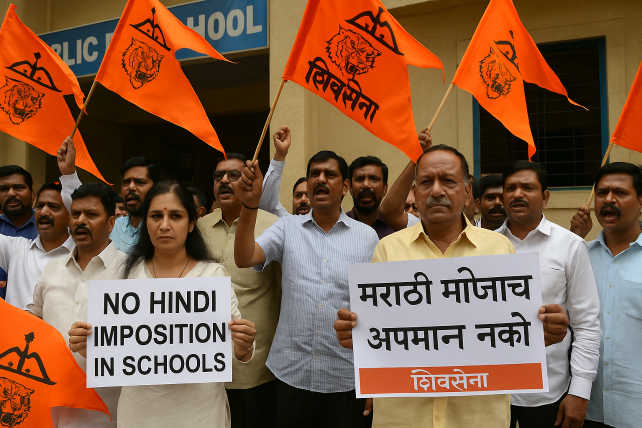In a politically charged development, the Shiv Sena (Uddhav Balasaheb Thackeray) faction has launched a sharp protest against the Maharashtra government’s recent proposal to make Hindi a compulsory third language in all state-run and aided schools. The move, announced earlier this week by the state education department, has been condemned as an attack on Marathi linguistic and cultural identity.
The policy, if implemented, would make Hindi the third mandatory language after Marathi and English across all government, private, and semi-government institutions. While the state claims this is in line with the National Education Policy (NEP) 2020, regional parties, especially the Thackeray-led Shiv Sena, see it as an attempt to undermine the status of the Marathi language in its own home.
🔥 Political Firestorm Erupts Over Language
Former Chief Minister Uddhav Thackeray, addressing party workers in Mumbai, called the policy “an assault on Maharashtra’s pride.” He stated, “We respect all languages, but no government has the right to impose Hindi on Marathi soil. Marathi is not just a language, it is our identity, our culture, and our voice.”
A series of state-wide protests, dharnas, and marches have been announced by the party, starting July 1 in Pune, Nashik, Nagpur, and Mumbai. Placards reading “Marathi Maanacha Apmaan Nako” (Don’t Disrespect Marathi Pride) have already begun circulating on social media.
📜 Government’s Stand on Hindi Implementation
Defending the move, Education Minister Deepak Kesarkar stated that the policy is aimed at ensuring linguistic inclusivity and better national communication. According to the minister, many students in Maharashtra struggle when they migrate for higher education or jobs due to poor command of Hindi.
“This is not about imposition. It’s about equipping students with multilingual skills. Marathi remains our priority, but Hindi opens wider national opportunities,” said Kesarkar in a press interaction.
However, critics argue that such justifications fail to address the emotional and cultural significance of the Marathi language, especially when the state has always been fiercely proud of its heritage.
🗣️ Experts and Civil Society React
Language experts and cultural historians in Maharashtra have expressed concerns over what they call the “creeping centralization” of linguistic policy.
Dr. Shaila Deshpande, a linguistics professor from Mumbai University, noted, “Language is deeply tied to identity. When a dominant language is promoted officially, other languages gradually lose ground, especially among the younger population.”
Artists, writers, and playwrights from the Marathi literary world have also raised their voice, warning that such a policy could erode the richness of Maharashtra’s literary and cultural ecosystem.
📊 Educational Impact: Students and Schools Divided
The proposal has sparked mixed reactions among educators and school administrators. While some urban private schools welcomed the policy citing increased demand for Hindi skills in competitive exams and migration, rural Marathi-medium schools expressed serious concerns about faculty availability and additional burden on students.
“We are already struggling with a shortage of Marathi teachers. Where will we find qualified Hindi instructors?” asked a principal from Jalgaon.
In many institutions, curriculum adjustments have not yet been clarified, creating confusion over how the third language will be integrated without compromising existing syllabi.
📢 What’s Next? Public Backlash Builds
The Shiv Sena (UBT) has urged parents, teachers, and students to join hands in the protest to protect the linguistic sovereignty of Maharashtra. Social media campaigns under hashtags like #MarathiMajhyaManacha and #StopHindiImposition have been trending regionally.
Meanwhile, the Congress and NCP (Sharad Pawar faction) have extended support to the protest, accusing the Shinde-Fadnavis government of aligning blindly with the central government’s language policies, at the cost of regional identity.
📌 Final Thoughts
The proposed Hindi mandate may seem like a small curriculum update on paper, but for millions of Maharashtrians, it’s much more—a challenge to their cultural roots and the beginning of a deeper linguistic debate. Whether the government moves forward with the policy or bows to the pressure of regional sentiment remains to be seen.
But one thing is clear: in Maharashtra, language is not just a medium—it is an emotion. And that emotion is now ready to speak, shout, and resist.

